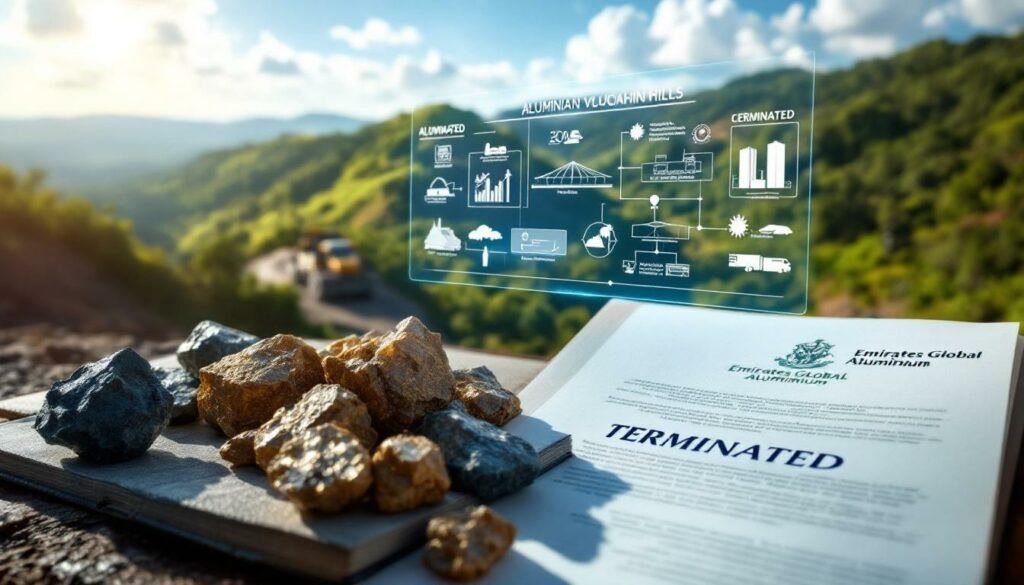Why Did Ghana Cancel Its $1.2bn Bauxite Lease with Rocksure International?
Ghana's recent decision to terminate its $1.2 billion bauxite mining agreement with Rocksure International marks a significant pivot in the West African nation's approach to managing its substantial mineral resources. This cancellation signals a strategic shift in how Ghana plans to develop its natural wealth and reflects broader trends in resource governance across the African continent.
The termination represents Ghana's evolving strategy to maximize the value of its vast bauxite reserves, which rank seventh globally. By reassessing its partnerships and development approach, Ghana aims to better position itself in the global aluminum supply chain while ensuring greater benefits for its citizens through various bauxite project benefits.
Legal Foundations for the Termination
The primary reason behind the cancellation lies in a critical legal technicality: the $1.2 billion (12.56 billion cedis) bauxite lease with Rocksure International was never ratified by Ghana's parliament. According to Ghana's legal framework, specifically a landmark 2019 Supreme Court ruling commonly referred to as the "Exton Cubic ruling," any mining lease that lacks parliamentary ratification is considered void under Ghanaian law.
As one source cited by Reuters explained: "By the Exton Cubic ruling, without ratification, you have no lease." This legal precedent provided the Ministry of Lands and Natural Resources with clear grounds to inform Rocksure of the lease termination.
Structure of the Canceled Joint Venture
The terminated agreement involved a complex ownership structure designed to develop the Nyinahin Hills bauxite deposits in central Ghana:
- Rocksure International held a 70% controlling stake
- Ghana Integrated Aluminium Development Corporation (GIADEC) maintained a 20% interest
- The Ghanaian government retained a 10% ownership position
Operating as the Asante Bauxite Company joint venture, the partnership had ambitious plans to establish both mining operations and an alumina refinery to process raw bauxite into higher-value materials, creating a more integrated aluminum value chain within Ghana.
What Makes Ghana's Bauxite Resources Strategically Important?
Ghana's Position in Global Bauxite Markets
Ghana possesses approximately 900 million tonnes of bauxite reserves, making it the seventh-largest holder of bauxite globally. This substantial resource base represents a significant economic opportunity in the aluminum value chain, particularly as global demand for lightweight metals continues to grow across automotive, aerospace, and construction sectors.
The country's bauxite sector has been expanding steadily in recent years. According to the Ghana Chamber of Mines, national bauxite output reached a record 1.7 million tonnes in 2024, with forecasts projecting production to increase to 2 million tonnes by 2025. This growth trajectory underscores the increasing importance of bauxite to Ghana's mining sector and export economy, which has been accelerated by recent mining industry reforms.
The Nyinahin Hills Deposit
The specific deposit covered by the terminated lease contains around 376 million tonnes of bauxite, representing over 40% of Ghana's total estimated reserves. Located in central Ghana, the Nyinahin Hills area is considered one of West Africa's richest bauxite deposits due to both its quantity and quality.
The exceptional quality of the Nyinahin deposit is characterized by relatively low silica content and favorable alumina-to-silica ratios, making it particularly attractive for processing. These geological factors contribute significantly to the deposit's strategic value, as they translate to potentially lower processing costs and higher-quality end products.
How Is Ghana Pivoting Its Bauxite Development Strategy?
Pursuit of International Partnerships
Following the cancellation, GIADEC has begun actively seeking new investment partners with global experience in bauxite mining and aluminum production. This strategic pivot suggests Ghana is prioritizing partnerships with established international operators who can bring advanced technical expertise, sustainable mining practices, and access to global markets.
By shifting away from the previous arrangement with Rocksure International, Ghana appears to be pursuing a more globally integrated approach to developing its bauxite resources. This strategy aligns with broader trends across resource-rich African nations seeking to enhance value capture from natural resources.
Potential New Partners
Several major international companies have expressed interest in Ghana's bauxite resources:
- Emirates Global Aluminium (EGA) has signed a memorandum of understanding with GIADEC to explore collaboration opportunities
- Multiple Chinese companies are reportedly in discussions with Ghanaian authorities
- Western mining conglomerates have shown preliminary interest in the newly available concession
EGA, which recently lost mining rights in Guinea, has specifically noted that "sourcing bauxite from Ghana aligns with our objective to grow aluminium production by diversifying our supply base." This statement, reported by Mining Technology in 2025, indicates the strategic importance of Ghana's resources in global aluminum supply chains.
However, EGA has cautioned that they are still "assessing technical and commercial parameters" and that "no binding agreements have been reached" as discussions continue.
Development Timeline
Despite the lease cancellation, GIADEC maintains ambitious development plans, aiming to begin extraction from the Nyinahin Hills area (known as Block B) in the first quarter of 2026. While no definitive agreements have been finalized, discussions with potential international partners are reportedly at an advanced stage.
The development timeline reflects Ghana's urgency to monetize its bauxite reserves while also allowing sufficient time to secure the right partnerships and ensure proper environmental and social impact assessments are completed.
How Does This Fit into Ghana's Broader Mining Reforms?
Legislative Overhaul
The Rocksure deal cancellation coincides with Ghana's implementation of significant changes to its mining legislation—the most extensive reform of the country's mining laws in nearly two decades. These reforms include:
- Shortening mining license periods to encourage faster resource development
- Mandating direct revenue-sharing mechanisms with local communities affected by mining operations
- Increasing transparency requirements for mining agreements
- Strengthening environmental protection provisions
- Enhancing local content requirements to boost domestic economic benefits
These reforms represent Ghana's attempt to modernize its mining framework and address historical challenges in the sector, including ensuring communities receive tangible benefits from mining activities in their regions.
Regional Resource Nationalism Trends
Ghana's actions reflect a broader trend across West Africa, where resource-rich nations are increasingly seeking to derive greater value from their natural resources amid rising commodity prices. This shift often involves:
- Renegotiating existing agreements
- Increasing state participation
- Implementing stronger local content requirements
- Prioritizing in-country processing over raw material exports
Guinea, which holds the world's largest bauxite reserves, has similarly pursued policies to increase state benefits from its mining sector, as reported by Mining Weekly. However, Ghana's approach appears more measured, seeking to balance assertive resource governance with maintaining an attractive investment environment.
Balancing Investment and National Interest
The strategic pivot demonstrates Ghana's attempt to balance attracting necessary foreign investment while ensuring national benefits from resource extraction. By seeking partnerships with major international operators, Ghana aims to access the capital and expertise needed for development while maintaining significant state involvement through GIADEC.
This balanced approach reflects lessons learned from previous resource development efforts and aims to avoid both extremes: excessive state control that deters investment and overly generous terms for foreign investors that limit national benefits.
What Challenges Has Ghana Faced in Bauxite Development?
Infrastructure Limitations
Despite possessing substantial bauxite reserves, Ghana has historically struggled to secure consistent investment in the mining and refining infrastructure necessary to fully capitalize on these resources. The aluminum value chain requires significant capital investment, particularly for processing facilities.
Key infrastructure challenges include:
- Inadequate transportation networks connecting mining areas to ports
- Insufficient power generation capacity for energy-intensive processing
- Limited water management systems necessary for sustainable operations
- Underdeveloped port facilities for handling increased export volumes
Addressing these infrastructure gaps requires coordinated investment across multiple sectors and represents a significant hurdle to fully realizing the value of Ghana's bauxite resources.
Value Chain Integration
Ghana's ambitions extend beyond simply exporting raw bauxite. The country aims to develop an integrated aluminum industry that includes:
- Bauxite mining operations
- Alumina refineries to process raw bauxite
- Aluminum smelting facilities
- Downstream manufacturing of aluminum products
This vertical integration strategy has proven challenging to implement due to the massive capital requirements and technical complexity involved. Each step in the value chain requires specialized expertise and substantial investment, making it difficult to develop the entire chain simultaneously.
Environmental and Social Considerations
Bauxite mining in Ghana faces environmental challenges, particularly as some deposits are located in environmentally sensitive areas. Balancing resource development with environmental protection and community interests remains an ongoing challenge for the country's mining sector.
Environmental concerns include:
- Potential impacts on forest reserves and biodiversity
- Water pollution risks from mining operations
- Soil erosion and land degradation
- Dust emissions affecting local communities
Addressing these concerns requires robust environmental management systems and community engagement practices, adding complexity to bauxite development efforts.
What Are the Economic Implications of Ghana's Bauxite Strategy?
Potential Revenue Generation
Successfully developing Ghana's bauxite resources could generate significant economic benefits:
- Export revenue from bauxite and processed aluminum products
- Job creation across the mining and processing value chain
- Tax revenue from mining operations and related activities
- Development of supporting infrastructure that benefits broader economic activity
- Technology transfer and skills development
Industry analysts estimate that a fully developed aluminum value chain could contribute up to 2% to Ghana's GDP annually, representing a significant economic opportunity and creating numerous mineral beneficiation opportunities.
Investment Requirements
The development of Ghana's bauxite resources requires substantial capital investment:
- The canceled Rocksure deal was valued at $1.2 billion
- Full development of an integrated aluminum industry would likely require several billion dollars of investment
- Infrastructure development (transportation, power, water) represents additional investment needs
- Environmental protection measures require dedicated funding
Securing this level of investment remains a challenge, particularly in a competitive global environment where investors have multiple options for deploying capital in the mining sector.
Economic Diversification
Ghana's pursuit of bauxite development aligns with broader economic diversification goals, as the country seeks to reduce its historical dependence on gold mining and cocoa exports. Developing the aluminum value chain could create a more resilient and diversified economic base, opening up new investment opportunities.
This diversification strategy is particularly important given the price volatility that has historically affected Ghana's primary exports. By developing the bauxite-aluminum sector, Ghana aims to create a more stable economic foundation less vulnerable to commodity price fluctuations.
FAQs About Ghana's Bauxite Industry
What is bauxite and why is it valuable?
Bauxite is the primary ore used in aluminum production worldwide. It contains aluminum hydroxide minerals (primarily gibbsite, boehmite, and diaspore) that can be processed into alumina (aluminum oxide) and then smelted into pure aluminum metal.
As a lightweight, corrosion-resistant metal, aluminum is essential for applications ranging from beverage cans to aircraft components, making bauxite reserves strategically valuable. The growing emphasis on lightweight materials in transportation to improve fuel efficiency has further increased aluminum's importance.
How does Ghana's bauxite strategy compare to other African nations?
Ghana's approach shares similarities with Guinea, which holds the world's largest bauxite reserves and has similarly sought to increase state participation and local benefits from mining. However, Ghana appears to be pursuing a more deliberate strategy of partnering with established international operators rather than relying primarily on domestic companies.
Other key differences include:
- Ghana's stronger emphasis on vertical integration through GIADEC
- More transparent partnership structures with clearer equity distributions
- Greater focus on environmental considerations in mining plans
- More measured approach to resource nationalism balancing investment attraction with national benefits
What environmental concerns surround bauxite mining in Ghana?
Bauxite mining can cause significant environmental impacts, including deforestation, soil erosion, and water pollution. In Ghana, environmental groups have expressed concerns about mining in forest reserves and watersheds.
Specific environmental considerations include:
- Potential impacts on the Tano River Basin, a critical water source
- Forest cover loss in the Nyinahin Hills region
- Biodiversity threats in environmentally sensitive areas
- Rehabilitation requirements for mined areas
Any new development partnerships will need to address these environmental considerations to gain community support and regulatory approval. Modern mining practices can mitigate many of these impacts, but they require proper planning, implementation, and oversight.
How might global aluminum market trends affect Ghana's bauxite strategy?
The global aluminum market experiences cyclical price fluctuations based on supply-demand dynamics. Ghana's long-term bauxite strategy must account for these market cycles, as well as potential disruptions from technological changes in aluminum production or recycling.
Key market factors include:
- Chinese aluminum production capacity and demand
- Global transportation sector trends (automotive, aerospace)
- Construction industry cycles
- Recycling rates for aluminum
- Energy costs for aluminum smelting
The country's focus on securing partnerships with established global players suggests an awareness of these market realities and the importance of connecting to global supply chains and expertise.
Further Exploration:
Readers interested in learning more about Ghana's mining sector developments can also explore related educational content from Mining Technology, which offers additional perspectives on resource development strategies in West Africa.
Want to Know When the Next Major Mineral Discovery Happens?
Discover how ASX announcements can reveal significant investment opportunities before the broader market with Discovery Alert's proprietary Discovery IQ model. Explore our dedicated discoveries page to see how historic mineral discoveries have generated substantial returns for early investors.




